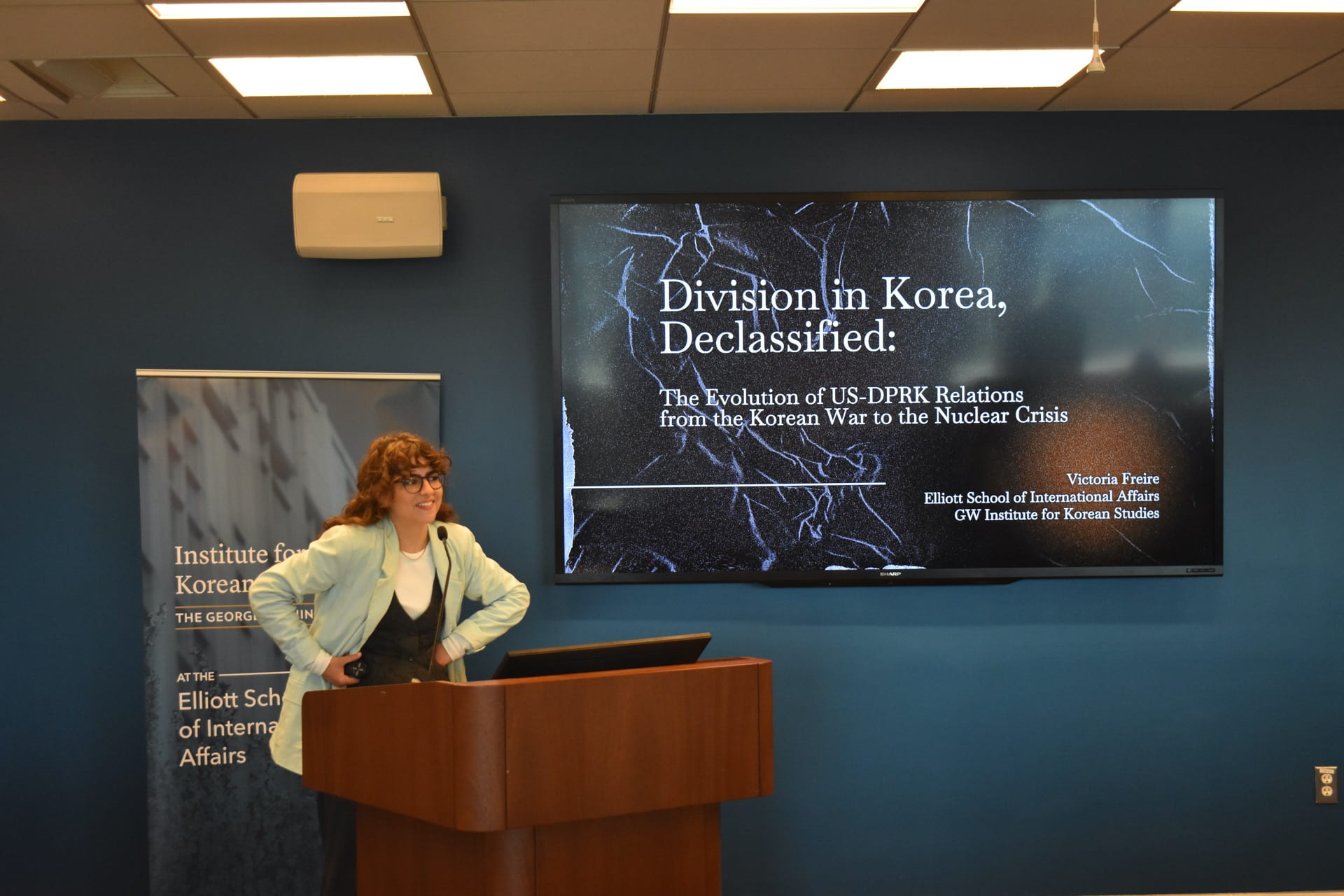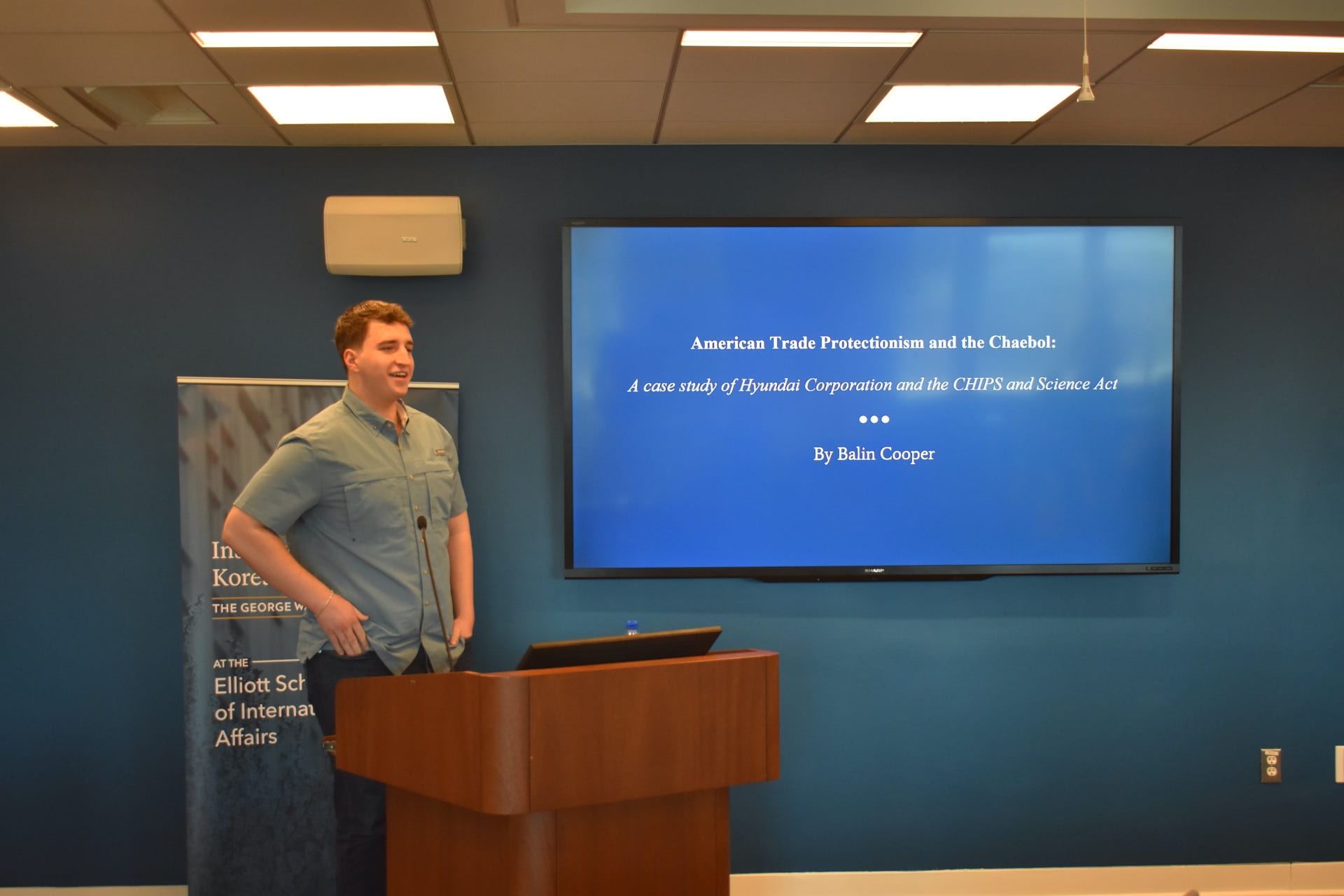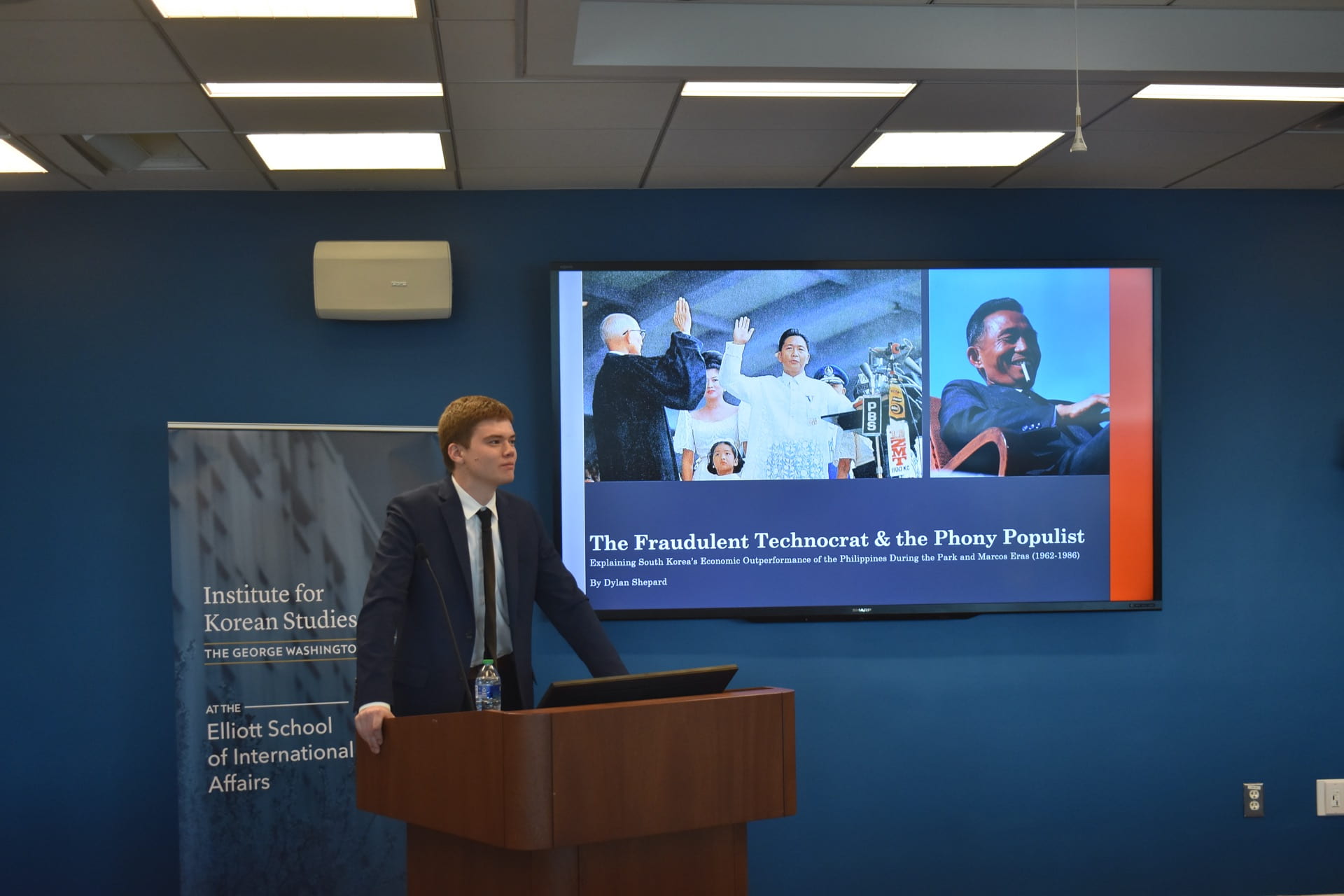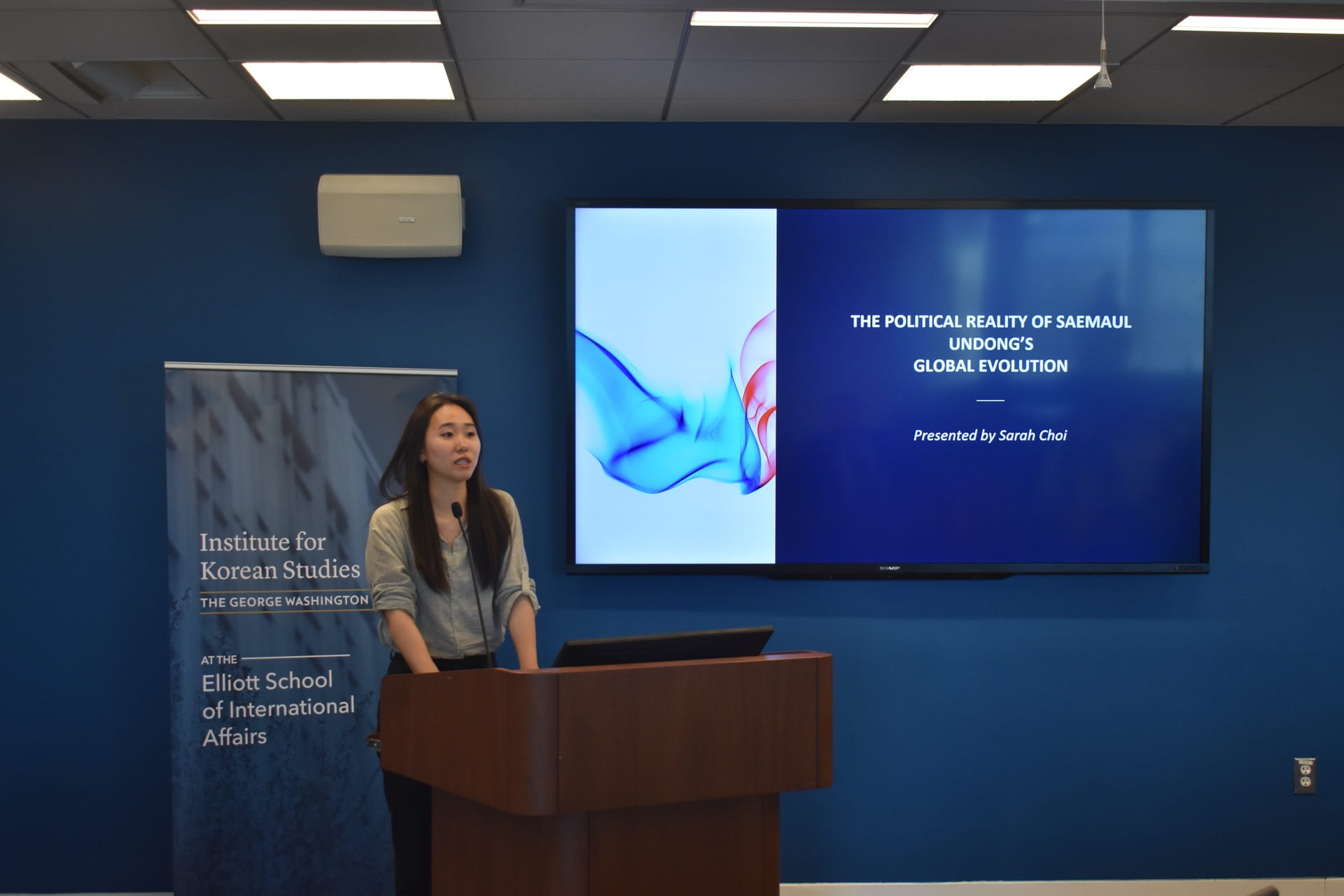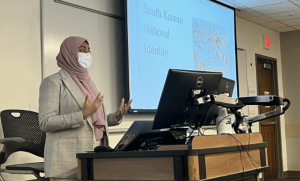Selected students will present their papers at the annual GW-IU Korean Studies Undergraduate Research Exchange Conference in the spring semester. Through this academic exchange program, students will not only hone their formal presentation skills but will also learn how to engage in academic dialogue with colleagues from a range of backgrounds and disciplines.
The 7th Annual Conference of GW-IU Undergraduate Research Exchange Program (2024-2025)
On March 29, 2025, the 7th Annual Conference of GW-IU Undergraduate Research Exchange Program was held in person at George Washington University. Five students from the George Washington University and four students from Indiana university presented papers based on their original research.
Event Program (PDF) for 2024-25 Conference

Presenters from the George Washington University
Dong Hyun Hong: “Rewriting Masculinity: A Study of Evolving Gender Roles in Korean Cinema Post-2000”

Truth Jackson: “Sanctions, Solidarity, and Subversion: Unpacking North Korea-Uganda Military Ties Under Kim Jong-Un” (Morehouse College)
Lauren Labogin-Moses: “Gender, Mental Health, and Activism: The Role of Literature in South Korea’s Feminist Movement“
John Lee: “The Long-Run Effect of the US CHIPS Act on South Korean Security“

Avia Solomon: “The Demystifying Decade: How US Involvement in 1980s South Korean Affairs Contributed to Anti-American Sentiment“
Jasmine Mann: “How Have the Government Policies of the Soviet Union, Russia, Republic of Korea, and Democratic Republic of North Korea Affected the Identity of the Koryo-Saram as a Transborder Nation?” (Spelman College)
The 5th Annual Conference of GW-IU Undergraduate Research Exchange Program (2022-2023)
On April 1, 2023, the 5th Annual Conference of GW-IU Undergraduate Research Exchange Program was held in person at George Washington University. Six students from the George Washington University and four students from Indiana university presented papers based on their original research.
Event Program (PDF) for 2022-23 Conference
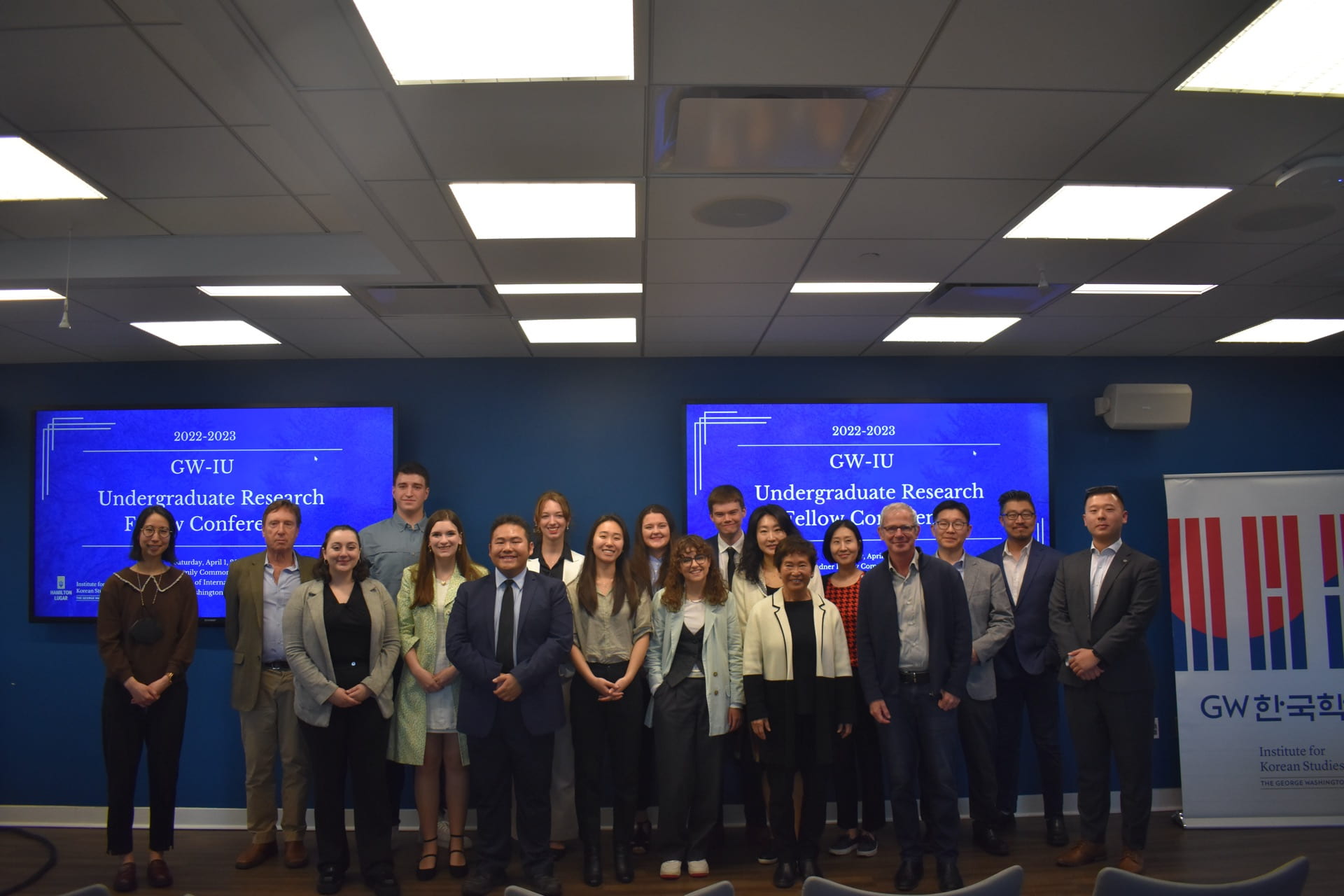
Presenters from the George Washington University
Emily Neal: “The Henequenero Legacy: The Development of the Korean Mexican Identity”
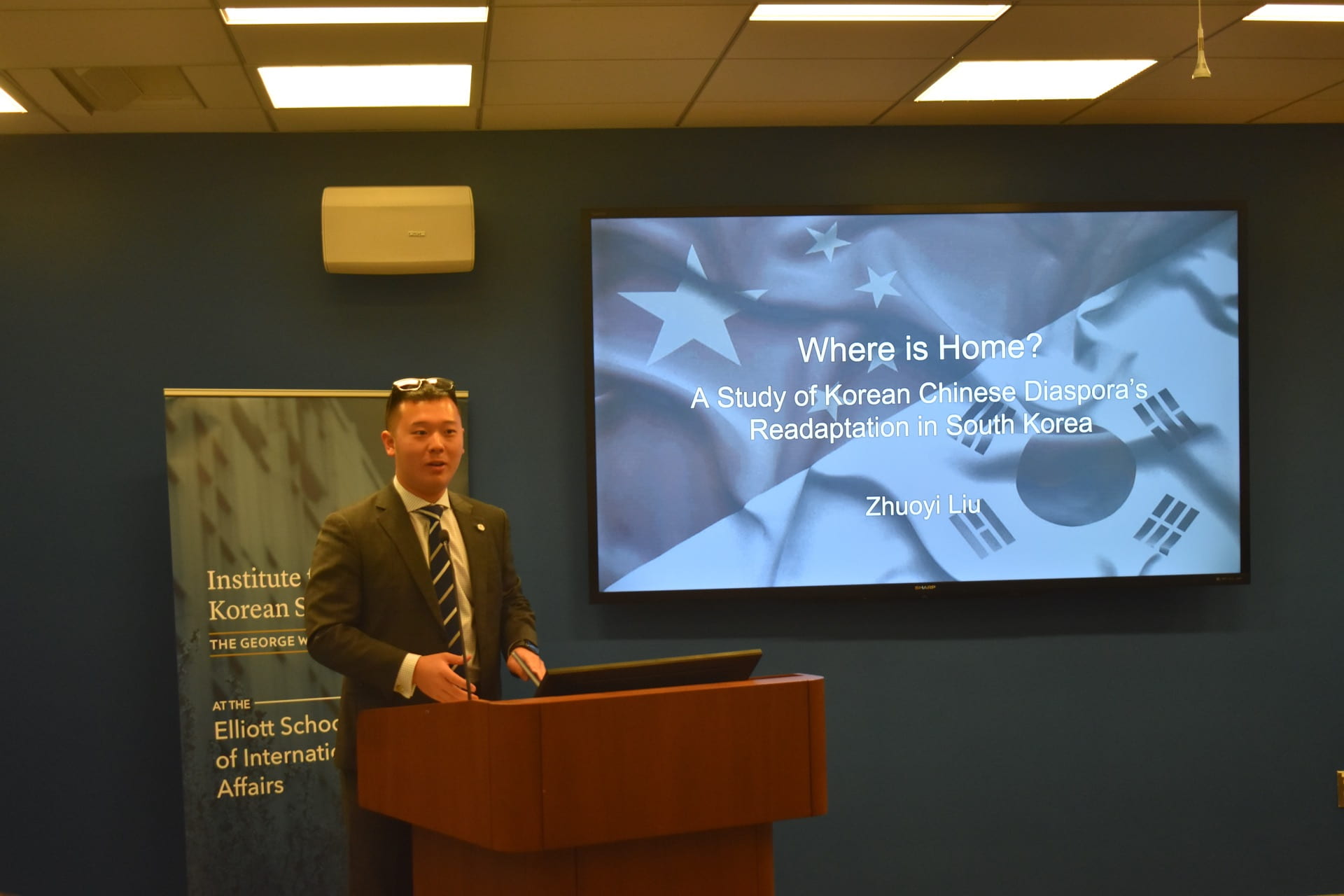
Zhuoyi Liu: “Where is Home?”-A Study of the Korean Chinese Diaspora’s Readaptation in South Korea”
Victoria Freire: “Destructive Division in Korea, Declassified: The Evolution of US-DPRK Relations from the Korean War to the Nuclear Crisis”
Balin Cooper: “American Trade Protectionism and the Chaebol: A Case Study of Hyundai Corporation and the CHIPS and Science Act”
Dylan Shepherd: “The Cold War, the Phony Populist, and the Fraudulent Technocrat: How the Republic of Korea Economically Outperformed the Philippines During the Park and Marcos Era”
Sarah Choi: “Saemaul Undong as an International Development Model: The Political Reality of SMU’s Evolution
The 4th Annual Conference of GW-IU Undergraduate Research Exchange Program (2021-2022)
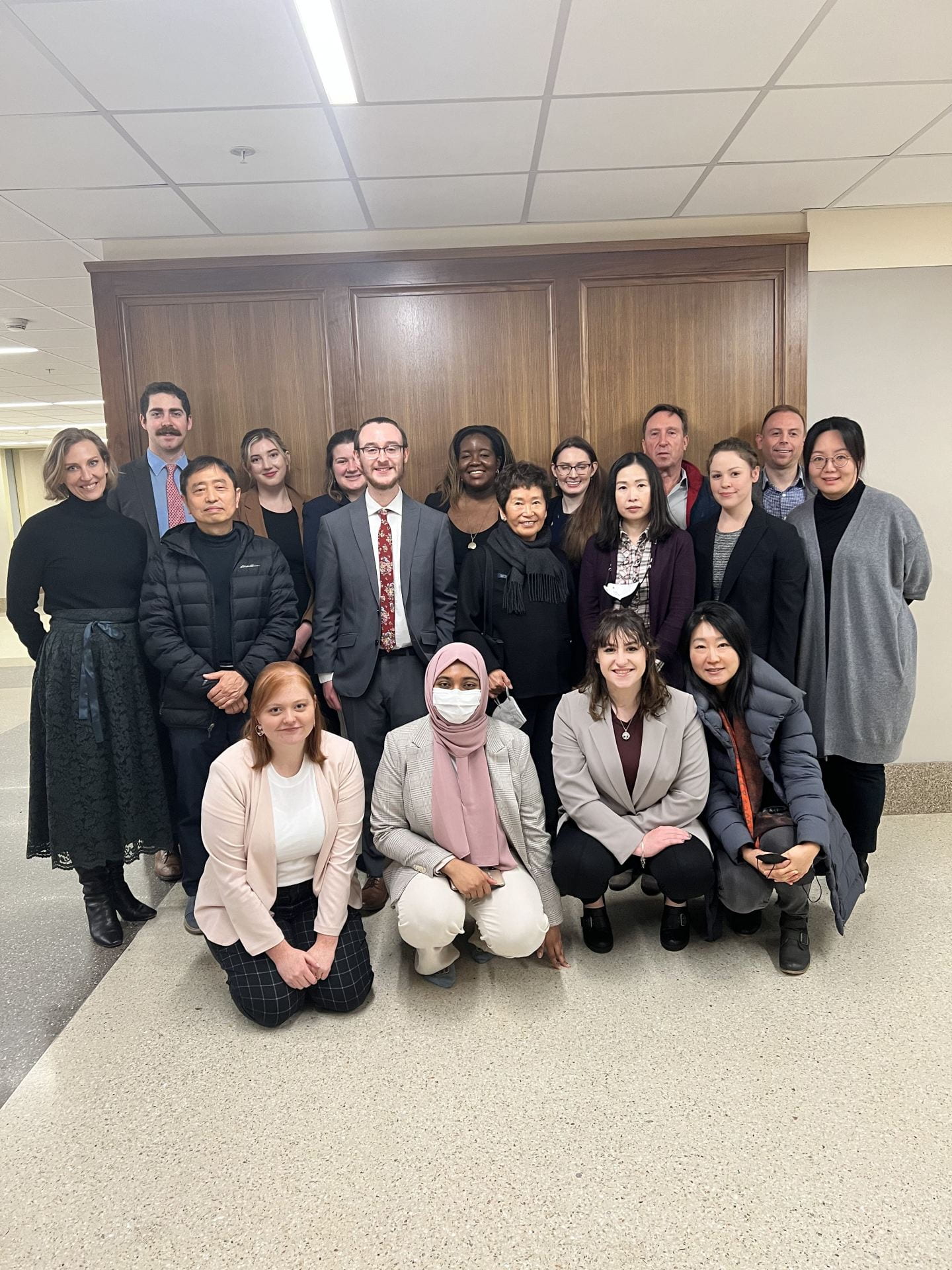 On April 8-10, 2022, the 4th Annual Conference of GW-IU Undergraduate Research Exchange Program was held in person for the first time since 2019, at Indiana University. Five students from the George Washington University presented papers based on their original research.
On April 8-10, 2022, the 4th Annual Conference of GW-IU Undergraduate Research Exchange Program was held in person for the first time since 2019, at Indiana University. Five students from the George Washington University presented papers based on their original research.
Event Program (PDF) for 2021-22 Conference
Presenters from the George Washington University
Nabihah Begum: “South Korean National Identity: Perceptions of Youth Through an Economic Lens”
Abstract: Historically, South Korea’s national identity has been established in the reunification discourse of North and South Korea as well as anti-Japanese colonial sentiments. Recently, an additional aspect in the Korean national identity and nationalism by Koreans developed amid globalization. This paper investigates the civic national identity of South Korean youth as this group defines the expansion and transformation of the nation. These perceptions align with Korean civic practices of today and can assist with prospects for South Korea’s political and social aspirations.
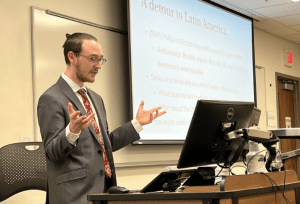
Fletcher Calcagno: “The Politics of Maturity in US-Occupied Korea (1945-1950)”
Abstract: Following post-WWII decolonization, the US had to reassess the status of many formerly colonized nations. During the Truman administration, the concept of “political maturity” grew in popularity as a framework for understanding a group of people’s preparedness for self-governance. This project makes use of archival sources to examine the impact of “political maturity” on US decision-making in the southern half of the Korean peninsula from 1945 to 1950. In doing so, it provides more insight into how US foreign policy decision-making functioned in the early Cold War.
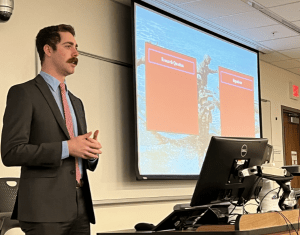
Tucker Hamilton: “North Korean Conventional Deterrence: How the Kim Regime Relies on its Nonnuclear Arsenal to Dissuade Foreign Intervention”
Abstract: Often, security analysts overweigh the value and significance of North Korea’s nuclear deterrence capabilities due to their tremendous power. While not insignificant, North Korea’s current nuclear assets do not adequately protect North Korea from foreign intervention due to flaws in the credibility of the Kim regime’s arsenal. So, while North Korea’s nuclear weapons garner the majority of the attention and the credit for “deterring” foreign intervention, the reality is far more nuanced. Indeed, conventional capabilities remain underappreciated by politicians, security policy experts, and North Korea analysts for their deterrent effects as well as the opportunities they afford the North Korean regime to control the ladder of escalation with South Korea without triggering and incurring the costs of general war. In particular, artillery, special forces, cyber units, and biological and chemical capabilities each measurably benefit North Korean deterrence and security; generating a robust combination of deterrence by denial and deterrence by punishment. Ultimately, North Korea’s nuclear capabilities are theoretically and practically a weak deterrent compared to its conventional assets, and this explains why those weapons systems still feature so prominently in state military and deterrence strategy.
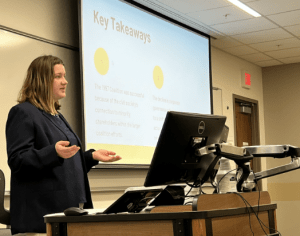
Savannah Sauers: “Coalition Building in South Korea: Civil Society as the Backbone of Coalition Building”
Abstract: After the Asian Financial Crisis in 1997, the role of civil society in corporate governance reform involved building coalitions with multiple different actors, including minority shareholders within chaebol and the executive branch as well as foreign actors like the IMF and hedge funds. While there were initial successes through this coalition-building, after 2006, there was a noticeable decline within the coalition as priorities of actors changed as well as the actors themselves, specifically the change from the PSPD to the National Pension Service (NPS) as a means of holding chaebol accountable in terms of corporate governance. While the NPS could serve as the ‘watchdog’ for corporate governance like the PSPD, the proximity to the executive and historic corruption within the South Korean political economy inhibits the NPS’ ability. This evolution of coalition actors signifies the changing dynamics within South Korean economic policy over the past twenty-five years.
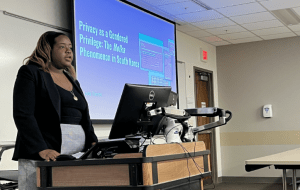
Jada Tanner: “Privacy as a Gendered Privilege: The Molka Phenomenon in South Korea”
Abstract: This paper examines the molka phenomenon in relation to contemporary masculinity as seen in male-dominated online spaces, the manosphere. This paper argues that molka cannot be understood solely through examining South Korea’s technological advancement, and one must understand molka’s connection with hegemonic masculinity and crises of masculinity in Korea to explain molka’s prevalence. To establish and explain this connection, this paper analyzes what characterizes crises of masculinity in Korea and how they manifest in the manosphere.
The 3rd Annual Conference of GW-IU Undergraduate Research Exchange Program (2020-2021)
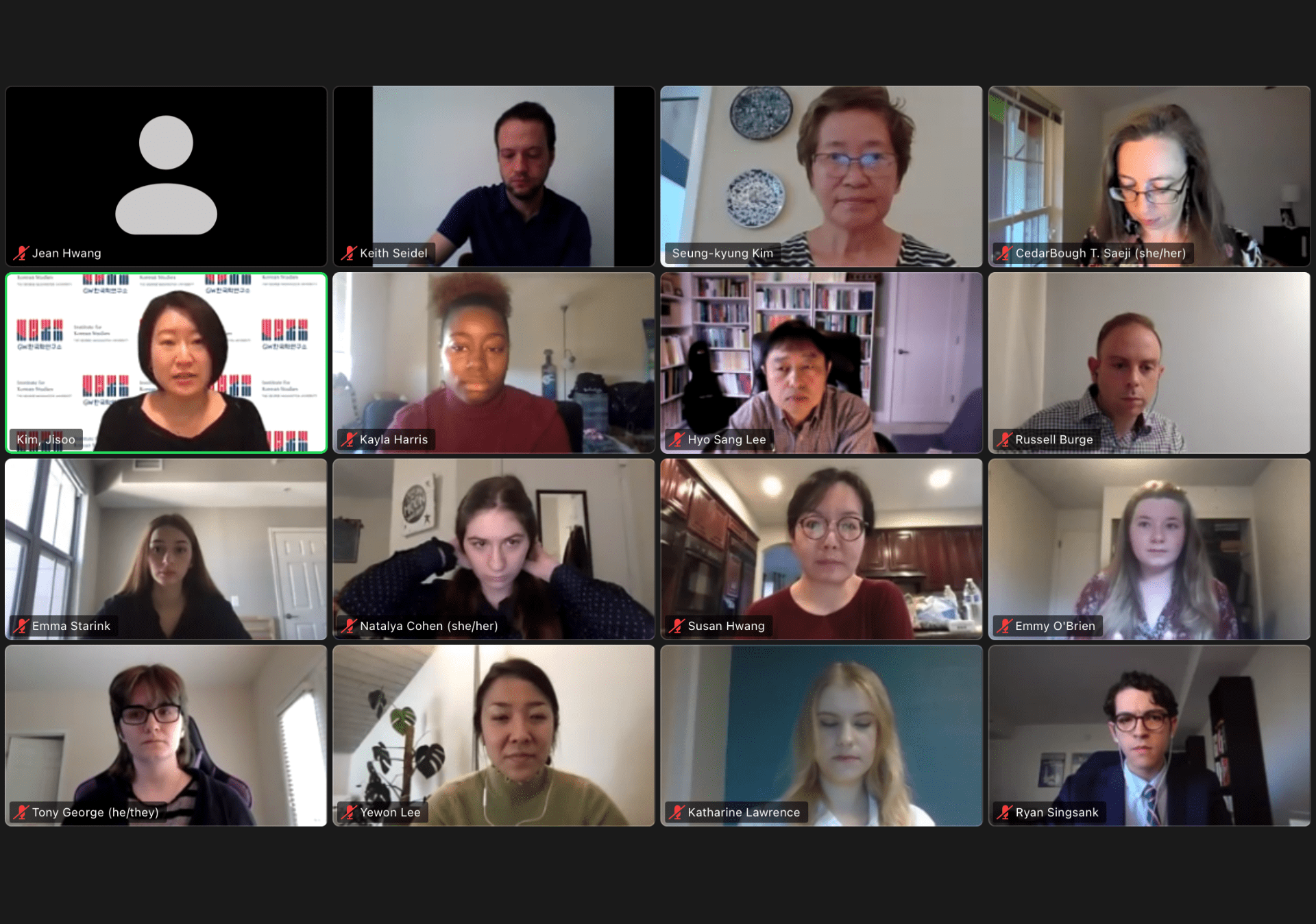 On April 21, 2021, the 3rd Annual Conference of GW-IU Undergraduate Research Exchange Program was held virtually by Indiana University via WebEx. Five students from the George Washington University presented papers based on their original research.
On April 21, 2021, the 3rd Annual Conference of GW-IU Undergraduate Research Exchange Program was held virtually by Indiana University via WebEx. Five students from the George Washington University presented papers based on their original research.
Event Program for 2020-21 Conference (PDF)
Presenters from the George Washington University
Sean Li: “How to Fix US-ROK SOFA”
Emerald O’Brien: “South Korea’ Covid 19 Response: Lessons Learned from MERS in Testing, Tracing, and Communicating”
Ryan Singsank: “How Park Chung Hee Gained from South Korea’s Involvement in the Vietnam War”
Emma Starink: “Understanding the Lagging Knowledge Dissemination of US Military’s Use of Agent Orange in South Korea”
The 2nd Annual Conference of GW-IU Undergraduate Research Exchange Program (2019-2020)
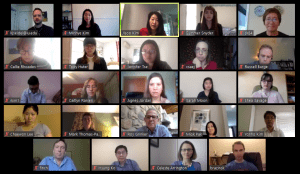 On May 13, 2020, the 2nd Annual Conference of GW-IU Undergraduate Research Exchange Program was held virtually via WebEx. Five students from the George Washington University presented papers based on their original research.
On May 13, 2020, the 2nd Annual Conference of GW-IU Undergraduate Research Exchange Program was held virtually via WebEx. Five students from the George Washington University presented papers based on their original research.
Event Program for 2019-2020 Conference (PDF)
Presenters from the George Washington University
Shea Savage, “Our Only Weapon is the Truth”: An Analysis of Protest, Patriotism, and Justice in Post-1987 South Korean Cinema
Abstract: South Korea’s relatively recent democratic transition features prominently in many Korean films. This period in Korean history is distinctive due to the extensive role mass protest movements played in triggering the collapse of Chun Doo-hwan’s autocratic regime and ensuring the country’s ensuing transition to democracy. While scholarship has dealt with Korea’s history of protest, as well as with its ever-expanding cinema industry, the literature on Korean films that engage with protest as a central theme is thin. Therefore, this article seeks to provide a systematic analysis of cinematic depictions of Korea’s 1980s-era protest movements as a step toward answering the question, “Why do people protest?” This paper argues that cinema’s answer to this question surrounds three central themes: patriotism, justice, and truth. These themes reflect greater Korean attitudes towards protest as a means of civic engagement. This research will allow for a deeper understanding of the long-lasting impacts of the “bottom-up” creation of Korea’s democracy, as well as the ongoing protest culture endemic to the Korean political experience.
Yuchen Dai, “Divided Memories on Park Chung Hee and Chiang Kai Shek: Root Causes and Legacies on Post-authoritarian Society Today”
Abstract: During the second half of the twentieth century, South Korea and Taiwan underwent a historic transformation under President Park Chung Hee’s and President Chiang Kai-shek’s authoritarian regimes respectively. Park and Chiang both have remained as controversial figures in their societies’ contemporary histories and the public debate on the assessment of them and their era continue to be full of rage today. This paper tries to examine the causes and implications of the mixed memories of President Park and Chiang. Some who have a positive memory of Park and praise his style of national development are often the older generation whose perception is shaped by their direct experience with Park’s era, whereas glorifying remembrance of Chiang largely relies on political socialization. Some who have a negative memory of the two leaders often recognize the repression and emotionally connect them with certain historical grievances. With a comparative lens, this paper applies the political socialization thesis in analysis and ultimately finds that divided memories on Park and Chiang reveal profound ideological division and social division, which often have been taken advantage of by partisan politics. Sustained reconciliatory efforts are necessary to build an inclusive and resilient civil society.
Mark Thomas-Patterson, “A Republican View of Rhee: The Chicago Tribune’s coverage of Syngman Rhee between 1945-1950”
Abstract: This paper aims to examine the attitude that the Chicago Tribune displayed towards the Korean leader Syngman Rhee from 1945-1950. The Tribune played a key role in providing a voice for conservative Republicans during the first half of the 20th century, under the ownership of Robert McCormick. The paper was split over foreign policy, as it supported stopping communism abroad but also supported non-intervention in global affairs. The political situation on the Korean peninsula therefore proved to be an especially challenging topic for the Tribune, as it forced it to choose between combatting communism and non-intervention. In order to ascertain the Tribune’s positions on these key issues, I analyzed articles that had been digitized as part of ProQuest’s historical archives. Throughout this relatively short period of time, the Tribune’s opinion of Rhee varied greatly. It initially supported Rhee as a hero against the Truman state department. After the paper got a reporter on the ground in Korea, the paper’s attitude shifted, and Rhee was portrayed as an ultranationalist zealot. In the end, the Tribune developed a stance of confronting communist advances and supporting anti-communist governments such as Rhee’s that would hold true for the rest of the cold war.
Jennifer Tse, “Evolution of Konglish Based on the Current Prevalence and South Korean Public Attitude Towards Konglish”
Abstract: Language is constantly changing over time, and the Korean language proves to be no different. Since the English language was introduced to the Korean peninsula, English has only continued to make notable influences on the Korean language. South Korea, post-WWII, has continually strived towards globalization and internationalism, thus prioritizing English education amongst South Koreans. In promoting the English language with an international outlook in perspective, South Korea has been tenacious in integrating English into their education systems, relating economic success to one’s proficiency in English. The combination of English and Korean language in these various forms led to the creation of Konglish, which has garnered mixed attitudes from the South Korean population. The widespread prevalence of Konglish proves that it will remain as a common language used in South Korea. However, the Korean public has expressed dissatisfaction with Konglish for a variety of reasons, but mainly because of its misinterpretations when translated to standard English. Given these dissatisfactions and the educational efforts made to alleviate them, it is likely that Konglish will evolve from its current form to resemble that of standard English.
Sarah Moon, “Analyzing Japan-South Korea Relations: The Impact of Sociocultural Interactions on Public Attitudes”
Abstract: As liberal democracies, geographic neighbors, and U.S. allies, Japan and South Korea seem to be natural allies in the increasingly precarious Indo-Pacific region. Nevertheless, episodes of conflict rooted in historical legacies have thwarted opportunities to forge a steadfast partnership, let alone an alliance. While their security and economic interests facilitated limited cooperation, the cultural arena has held promise for enhancing bilateral ties. Cultural appeal has expanded in both countries, and in theory, this attraction should have translated into stronger relations. The dire condition of the Japan-South Korea relationship calls into question the true extent to which sociocultural flows can win the hearts and minds of citizens. Therefore, the objective of this research is to determine whether sociocultural interactions have improved public attitudes. From 1988 to 2019, the quantity of sociocultural interactions increased, such as tourism, films, and broadcasting. However, the level of public attitudes did not reflect this upward trend. Public attitudes among South Koreans were overwhelmingly low, with most respondents expressing adverse views of Japan. Public attitudes in Japan were likewise negative, but compared to South Korea, Japanese citizens held more favorable views of their counterparts. Despite the lack of a discernable connection between the two variables, this research does not negate altogether the positive role of sociocultural interactions. Rather, it challenges the potential of soft power to heal divisions, perhaps undermined by the political elite’s poor management of historical narratives. In the meantime, their contentious relationship remains an anomaly to scholars and policymakers alike.
The 1st Annual Conference of GW-IU Undergraduate Research Exchange Program (2018-2019)
 On April 20, 2019, the 1st Annual Conference of GW-IU Undergraduate Research Exchange Program was held at Cloyd Heck Marvin Center of the George Washington University. Five students from the George Washington University presented papers based on their original research.
On April 20, 2019, the 1st Annual Conference of GW-IU Undergraduate Research Exchange Program was held at Cloyd Heck Marvin Center of the George Washington University. Five students from the George Washington University presented papers based on their original research.
Event Program for 2018-2019 Conference (PDF)
Read more about the Conference
Presenters from the George Washington University

Tanvi Banerjee, “Namaste Hallyu or Annyeong Gong-ju? Public Diplomacy and India – South Korea Relations”

R. Maxwell Bone, “Uganda-DPRK Relations: From 1972 to 2019”

Henry Huang Haoyu, “The Wake of the Tiger: Change of the Chinese-Korean Tribute System over Time”

Deanna Reyes-Guerra, “Recent Rise of Anti-Zainichi Sentimentality in Japan”

Tina Yiting Wang, “Capitalized Mind, Cosmeticized Body”





